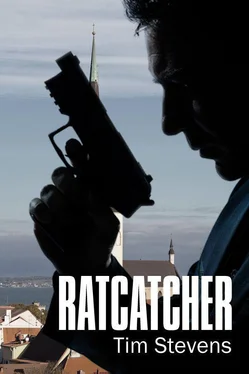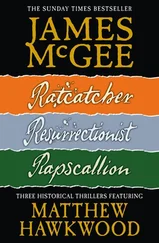Tim Stevens - Ratcatcher
Здесь есть возможность читать онлайн «Tim Stevens - Ratcatcher» весь текст электронной книги совершенно бесплатно (целиком полную версию без сокращений). В некоторых случаях можно слушать аудио, скачать через торрент в формате fb2 и присутствует краткое содержание. Жанр: Триллер, на английском языке. Описание произведения, (предисловие) а так же отзывы посетителей доступны на портале библиотеки ЛибКат.
- Название:Ratcatcher
- Автор:
- Жанр:
- Год:неизвестен
- ISBN:нет данных
- Рейтинг книги:5 / 5. Голосов: 1
-
Избранное:Добавить в избранное
- Отзывы:
-
Ваша оценка:
- 100
- 1
- 2
- 3
- 4
- 5
Ratcatcher: краткое содержание, описание и аннотация
Предлагаем к чтению аннотацию, описание, краткое содержание или предисловие (зависит от того, что написал сам автор книги «Ratcatcher»). Если вы не нашли необходимую информацию о книге — напишите в комментариях, мы постараемся отыскать её.
Ratcatcher — читать онлайн бесплатно полную книгу (весь текст) целиком
Ниже представлен текст книги, разбитый по страницам. Система сохранения места последней прочитанной страницы, позволяет с удобством читать онлайн бесплатно книгу «Ratcatcher», без необходимости каждый раз заново искать на чём Вы остановились. Поставьте закладку, и сможете в любой момент перейти на страницу, на которой закончили чтение.
Интервал:
Закладка:
‘Day after tomorrow.’
‘Is your trip anything to do — ’
He made a zipping motion at his mouth and she held up her hands in defeat. ‘Anything else?’
‘Be on standby. I might need your help later.’ He headed for the door, then paused. ‘Oh. Check on Kendrick, would you?’
‘I already gave him a ring. He’s back at home, they didn’t keep him in. I gave him your best wishes.’
‘And?’
‘Apart from his usual dismal takeoff of my accent, he said, “Tell him to stick his best wishes in his arse, and I hope the corners hurt.”’ Her eyes were huge, her smile bright.
By the time he reached the airport his spirits had sunk again and he’d begun to brood. The last time he’d seen Fallon was in the courtroom receiving his life sentence. He’d been caught four days after Claire’s murder coming off a chartered flight in Hamburg; his trial had been fast-tracked and swiftly conducted. After the judge had pronounced, Fallon had looked over at Purkiss, briefly, but there’d been nothing in his expression; no arrogance but no contrition either. The perfect agent, hidden, inscrutable.
And now a string of cockups and unanswered questions. The cynicism involved in his release was breathtaking but Purkiss found, unsettlingly, that he wasn’t surprised. Fallon was a superb agent and the Service had obviously had big plans for him at the time he murdered Claire. The fact that he had pleaded guilty was no doubt considered in mitigation. He’d denied involvement in the Asgari killing but had confessed to corruption, on which charge he received a concurrent sentence of twelve years.
Vale had said: ‘Of course it’s personal for you. But you have to look on this as a job, if not quite like any other then one with the same principles at stake. He’s a rogue agent who’s somewhere we don’t want him to be, less than forty-eight hours before an event of immense political significance.’ The subtext was, keep it professional , though Vale didn’t have to spell it out.
He’d cut it fine and the gate for his flight was already open when he got through the scanner. With him he had a shoulder bag with two days’ worth of clothes, nothing more. After leaving Abby’s he’d rung the number Vale had given him for the Tallinn contact, Seppo. The call had gone to voicemail. He hadn’t left a message. Striding towards the gate now he tried again. Six rings, then the beep. He cut the connection.
Vale had said Seppo was awaiting his call. While one failure to answer could be overlooked, two couldn’t. Once more he dialled.
‘Vale.’
‘Seppo hasn’t answered the phone. Twice.’
Silence for a second. ‘That’s not like him.’
‘I’m ditching the phone. If he rings you, tell him I’m going straight to his address.’ He rang off, ducked into the last set of public toilets before the gate, deleted the call history on the phone and tucked it behind the cistern in the furthest cubicle from the door. It might have been safe just to dump the handset in one of the bins but he wasn’t going to give bad luck an edge, not now that his contact in Tallinn appeared to have been compromised.
On the monitor the tiny beacon pulsed by a quirk of synchronicity in time to the ringing of the phone. The Jacobin glanced at the display: the same number again, from Britain and more specifically, as the beacon on the monitor confirmed, from Stansted Airport.
The Jacobin had noticed that the dead man, Seppo, owned a deep freeze, and had transferred the microwave meals and bags of frozen vegetables to the refrigerator until there was enough room, hoisted the body in, and closed the lid. A search of the flat revealed a laptop on a coffee table in the living room, its contents password protected.
Installing the equipment took a matter of minutes. The Jacobin prowled the flat a last time and, satisfied, departed.
On the way back the Jacobin phoned the mobile phone networks in turn, found the correct one on the second attempt. There was coldness and a little bluster at first, but once the necessary calls had been made, the woman came back ingratiating and not a little frightened. By the time the Jacobin was seated with the desktop computer booted up, the tracking was underway.
The Jacobin called up the schedules for Stansted. There it was, a two-fifteen budget airline flight to Tallinn. It was four twenty-five in Tallinn now and the time difference was two hours. The GPS tracking of the phone was taking place in real time, but the beacon on the monitor wasn’t moving. Either the owner of the phone hadn’t taken that flight or the phone had been left behind.
When there was no movement after half an hour, the Jacobin made two calls. The first was to demand the passenger manifest for the Stansted to Tallinn flight.
The second was answered curtly.
‘It’s me,’ the Jacobin said. ‘I need surveillance at the airport, set up within two hours.’
‘Who on?’
‘I don’t know yet.’
Four
The boy took his punishment in silence, flinching with each blow of the strap, at the last hissing between gnashed teeth. Afterwards he disappeared into his room.
A weak man would have avoided his wife’s reproachful gaze. Venedikt looked Marta full in the face.
‘You think it’s overkill.’
She sighed.
‘A lack of respect isn’t a minor transgression. It’s the root. Strangle it at source.’ He was aware he was lapsing into the jargon he used with his men.
Yuri was fourteen, sullen but usually wise enough to stay on the right side of well mannered. Tonight, after arriving home an hour beyond supper time, his eyes had slid past his father’s, and he’d met Venedikt’s final warning growl with his back. He was a fine boy, fundamentally. He would learn, as Venedikt himself had.
Venedikt had never liked his own father, but had always respected him, all the more because the man had taught him that to be respected was more important than to be liked. His grandfather on the other hand he had loved, and still did, which was odd as he had never met the man. He knew Vasily Petrovich from the stories his grandmother had told of her late husband, from the sight and feel and smell of his exquisitely preserved uniform, the heft of the medals when he lifted them out of their box.
He sat in his study, tea at his elbow — he didn’t drink, was opposed to all intoxicants — and awaited Dobrynin’s phone call, the final confirmation that tomorrow was to go ahead. Gazing at the photographs arrayed on his desk and on the walls, he allowed his thoughts to wander.
His grandfather, his dedushka , Vasily Petrovich, had fallen in the Narva Offensive in the late winter of 1944, fighting with the Soviet Second Shock Army to liberate Estonia from the fascists and from its own collaborationist government. As the widow of a war hero his grandmother had been permitted to settle in Estonia after the war with her young son, Venedikt’s father. She had embraced it as her homeland, as had her son and his.
From Vasily Petrovich, a hero whom he had never met, Venedikt had learned respect. Respect for one’s people, and one’s country, that was so unbending one would lay down one’s life to keep it alive. It was because of an understanding of the value of respect that Venedikt had, after his national service, decided to join the Estonian defence forces. He had served the Ground Force, the Maavagi, with distinction, rising to the rank of ensign. In August 1991 Estonia declared its independence from the Soviet Union, and announced that neither people who had settled in the country after 1940 nor their descendants had any automatic right to citizenship.
He was twenty-seven years old, young enough for the betrayal to be his first. It burned him.
Читать дальшеИнтервал:
Закладка:
Похожие книги на «Ratcatcher»
Представляем Вашему вниманию похожие книги на «Ratcatcher» списком для выбора. Мы отобрали схожую по названию и смыслу литературу в надежде предоставить читателям больше вариантов отыскать новые, интересные, ещё непрочитанные произведения.
Обсуждение, отзывы о книге «Ratcatcher» и просто собственные мнения читателей. Оставьте ваши комментарии, напишите, что Вы думаете о произведении, его смысле или главных героях. Укажите что конкретно понравилось, а что нет, и почему Вы так считаете.












